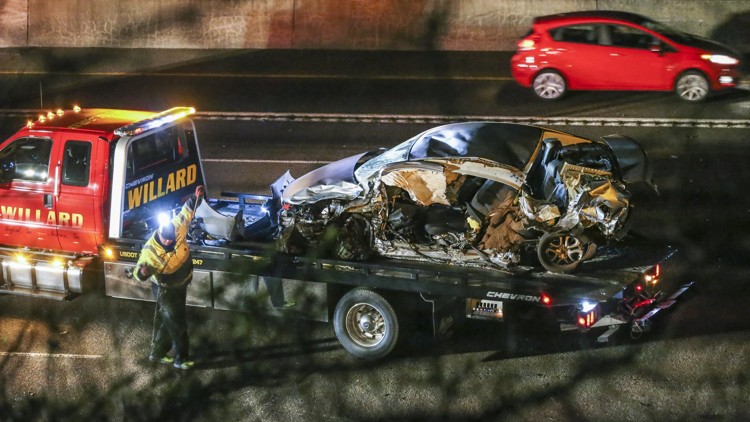Hoping to stem rising traffic fatalities on Georgia highways, state lawmakers Wednesday unveiled a proposal to require drivers to use hands-free cell-phone technology.
House Bill 673 also would increase the fine for distracted driving from $150 to up to $900 for repeat offenders. And it would increase the penalty from 1 point assessed against a driver’s license to up to 4 points for repeat offenders. Drivers with 15 points in a 24 month period lose their licenses.
At a press conference to announce the legislation, supporters said tougher penalties will change driver behavior that has contributed to a recent spike in traffic deaths and accidents.
“Crashes are increasing because of our addictive response to this device,” said Georgia State Patrol Col. Mark McDonough, holding up his cell phone.
Highway fatalities in Georgia rose by a third from 2014 to 2016, when 1,561 people died. Preliminary statistics show another 1,531 people died last year, though that number may rise as more deaths are reported.
Traffic crashes rose sharply in recent years, especially rear-end collisions, single-car crashes and crashes involving people age 15-25. Experts say distracted driving is a leading cause of crashes – as smart phones proliferate, people are paying attention to their devices instead of the road.
One result: Georgia led the nation in auto insurance premium increases in 2016.
Georgia currently bans anyone under 18 with a learner’s permit from using a wireless device while driving. The state also prohibits adults from texting while driving.
But local police recently told a House committee on distracted driving that the texting ban is unenforceable. They said it's hard for officers to tell whether a driver is dialing their phone – which is permitted under current law – or texting.
Rep. John Carson, R-Marietta, chaired the House committee that recommended the stiffer penalties. He said the new legislation would still allow drivers “one swipe” on their phones to make or answer calls. They also would still be allowed to use mapping apps. Otherwise, they’d have to keep their hands off their phones.
In recent months, the families of people who died because of distracted driving have told their stories to the House committee. One of them was Mandi Sorohan, whose 18-year-old son Caleb died in a traffic accident in 2009. He was texting while driving.
“Our lives will never be the same because of a text message,” she said at Wednesday’s press conference.
Sorohan lobbied lawmakers to tackle distracted driving, and Georgia’s existing law is named for Caleb.
“The law we got passed (in 2010) wasn’t what we wanted,” Sorohan said. “For years, we’ve been waiting for something stronger.”
According to the committee’s report, 15 states have enacted laws requiring drivers to use hands-free technology. Twelve saw decreased traffic fatalities in the two years following adoption of the laws — six of them a drop of more than 20 percent.
The committee decided not to recommend a complete ban on the use of mobile devices by drivers. Its report found no state has imposed such a ban, which it called “simply not realistic.”
If past efforts are any indication, it's no sure thing that a hands-free law can pass the General Assembly. Such laws have gone nowhere in the past.
Carson believes the latest initiative has a chance.
“Fatalities are increasing. (Insurance) premiums are increasing,” he said. “We have the data to prove it. And it’s the right thing to do.”
MYAJC.COM: REAL JOURNALISM. REAL LOCAL IMPACT.
The AJC's David Wickert keeps you updated on the latest in what's happening with transportation in metro Atlanta and Georgia. You'll find more on myAJC.com, including these stories:
Never miss a minute of what's happening in Atlanta transportation news. Subscribe to myAJC.com.
About the Author
Keep Reading
The Latest
Featured




